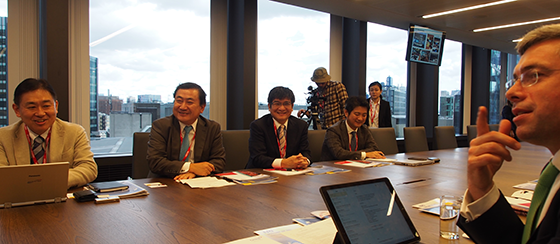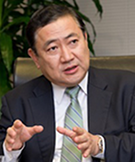On July 31st, 2017 a CSR Dialogue was held with five distinguished experts based in London attending. A subsequent CSR Dialogue was held on September 12th, 2017, with three experts based in Tokyo attending. The experts, Mr. Kenji Yokoyama, Senior Corporate Managing Director and managers of NRI, discussed and exchanged opinions on topics about ESG that NRI Group needs to understand and what is an appropriate response for us to be more attractive to global ESG investors.

(Affiliation and position as of September 2017)
 Colin Melvin Founder and Managing Partner, Arkadiko Partners |
What kind of relationship should NRI develop with investors? The true opportunity for the PRI and other initiatives, is to change how business and investment operate to the benefit of society, environment and economy. So, we need to avoid institutionalising responsibility as something separate. Regarding ESG indices, these should support the shift to responsible business, however, we should avoid simple comparisons which fail to describe fully the richness of companies' contribution. It is important for investors to understand whether the indices they use are fit for purpose. Milton Freedman's famous statement that the purpose of companies is to make profits for shareholders is wrong. Companies are the engines of wealth creation in our societies and economies. Their profitability is a consequence of doing something good and something useful in the right way. |
|---|---|
 Sachi Suzuki Engagement Manager, Hermes EOS |
What points should we cover when we explain our corporate governance to international
investors? We understand that each country has developed its own corporate governance system, and there is no 'one size fits all' model. It is important for NRI to capture the substance of what the global society expects, develop internal mechanisms to address that, and disclose information to respond to those expectations, even within the Japanese corporate governance framework. For example, we do not necessarily think the statutory auditor system per se is bad, but we ask for greater board effectiveness. While independence is very important, we also examine the monitoring function of the board, based on information received through engagement. In many cases, we start our engagement with IR executives and we may seek a meeting with independent directors as necessary. |
 Dr. Steve Waygood Chief Responsible Investment Officer, AVIVA INVESTORS |
What human rights issues we should be concerned about? We believe that digital rights will be an important theme in this sector. Digital rights include freedom of expression. We have been seeing governments forcibly shutting down the internet, and placing restrictions on freedom of expression. I would recommend that you consider how your business could potentially have a negative effect on these rights, and how you could provide a remedy to affected people. If you are automatically gathering personal information through NRI's business related to the Japanese government's 'My Number' personal identification system, it is very important to consider what human rights could be infringed by those operations, with reference to the Universal Declaration of Human Rights. How can NRI contribute in encouraging people to respect human rights, by integrating human rights perspectives into our business? There is a positive influence NRI could exert. Through your consulting business, you could convey the importance of respecting human rights in business. I would suggest you participate in conferences at the UN, OECD, Davos, the World Investment Forum and others. Those will provide a good opportunity for you to develop a network, and build your brand in sustainability. |
 Peter Webster CEO EIRIS Foundation |
What human rights issues we should be concerned about? To respect the human rights of workers in both your own company and in the supply chain, it is very important to 'know your vendors', and exercise your influence over the vendors to ensure all workers are appropriately treated, and respected in their work environment., I would add that the ILO Declaration on Fundamental Principles and Rights at Work and other internationally recognised human rights are all applied to workers both within your own business operations and your supply chain (in any industry, including ICT). How can NRI contribute in encouraging people to respect human rights, by integrating human rights perspectives into our business? I am interested in your shared online service, and what sort of IT support you could apply to the area of sustainability and respecting human rights. For example, if your IT service could provide information on companies' policies, activities, and performance in respecting human rights, that may help individual portfolio managers in selecting companies on the basis of human rights perspectives. |
 Mauricio Lazala Deputy Director, Business & Human Rights Resource Centre |
What human rights issues we should be concerned about? We understand that the ICT sector covers a very wide range of businesses, products and services. Looking at your four business areas, privacy rights might be more relevant to you, rather than the freedom of expression. Human rights issues should also be taken into account in the upstream of the supply chain. For example, I would recommend that NRI ensures conflict minerals are not used for your servers, and that energy for your machines and data centres is appropriately sourced, without human rights abuses. |
 Dr. Puvan J Selvanathan CEO, Bluenumber Foundation |
What kind of actions are required from NRI which is expanding into the global market from the
viewpoint of ESG in the future? The issues of ESG, including human rights and the environment, are closely linked with NRI's global strategies so that the two should not be considered separately. ESG is now a global, universal concept. We are in an era where ESG standards are used as a basis for quantitatively evaluating client firms that NRI provides its services to and firms that NRI acquires through M&A. In these global trends towards ESG, it is important to have a perspective of how NRI will develop its business in the future. In other words, as NRI promotes globalization, integrating NRI's products and services into ESG and developing ESG solutions and approaches could represent a significant business opportunity for NRI. |
 Haley St. Dennis Communications Manager, Institute for Human Rights and Business |
What is NRI's responsibility as an ICT company? It should be noted that if the Japanese government tried to wrongly use personal information, it would be NRI's responsibility to exercise some kind of influence along the lines of the concept of protection of privacy rights and try to correct it. What should be noted about human rights issues when responding to temporary staff? Generally, temporary staff are in a vulnerable position because recruitment agencies act as intermediaries and temporary staff cannot negotiate directly with the company that they will actually be working for on matters such as their working conditions. For example, in the U.K., even though such temporary staff may have equal education and skills as those with permanent employment, they receive substantially lower wages only for the reason that they are working as temporary staff. It is important that temporary staff are guaranteed the same rights as those with permanent employment. I will recommend that you expand a hotline to temporary staff. The complaints are a very important source of information for you to know what problems they have, and you will be able to take action before the problem gets worse. |
 Tomoko Hoshino Vice president, Environmental Partnership Conference (EPC) |
What should we do first about environmental activities for overseas bases? I think it will be good to actively transfer abroad the environment management systems and technology that Japanese firms excel in. Many developing countries are still afflicted by serious problems of environmental pollution, and Japan's experience in overcoming this problem can benefit those countries. I would like to see NRI navigate and lead efforts to create a sustainable society with partner firms. Stakeholder dialogue is important for both environment and human rights. Presence of a Japanese company will have impact on the local community one way or another. It will be important to maintain sufficient dialogue with the local community and government and to create an atmosphere that encourages shared discussions on matters of the environment and human rights. Since environmental and human rights issues are both involved with people's rights, I would advise you not to think of them separately. I would like to see NRI promote local stakeholder dialogue with a mindset that protecting the environment is also about protecting human rights of people to live in a beneficial living environment. |
 Kenji Yokoyama Senior Corporate Managing Director, NRI |
NRI has had several dialogues in Japan, but this dialogue was the first time for us to have a dialogue
abroad. The globalization of our company is increasing - for example, we are now completing the
acquisition of an Australian company. Right now the ratio of our overseas sales is about 7 percent, but
this is expected to rise. We understand that the more we globalize our business, the more we need to
respond to global investors, and would like to ask what aspects of ESG and human rights we should be
aware of in this regard. We truly appreciate this great opportunity through which we could listen to many valuable opinions and insights related to ESG, including human rights, from very famous foreign experts. Surprisingly, Japanese TV covered our CSR dialog in London. I felt that ESG investment is now being watched with keen interest not only in Western countries but also in Japan. I think that ESG investors will watch the enterprise ESG activities more strictly than before. Valuable opinions and insights acquired through the dialogue will be reflected in our business management and promotion of sustainability. We are building a sustainable tomorrow today. |
Other participants from NRI
Naoko Noro, General Manager, Corporate Communications Department
Yoshiro Shikino, General Manager, Administration Department
Kenji Honda, Manager of Sustainability & Responsibility Group
Shigeru Fujisawa, Manager, Sustainability & Responsibility Group
Facilitators
Hiroshi Ishida, Executive Director, Caux Round Table Japan
Saul J. Takahashi, Representative, Business & Human Rights Resource Centre Japan
(Published in 30, Nov. 2017)